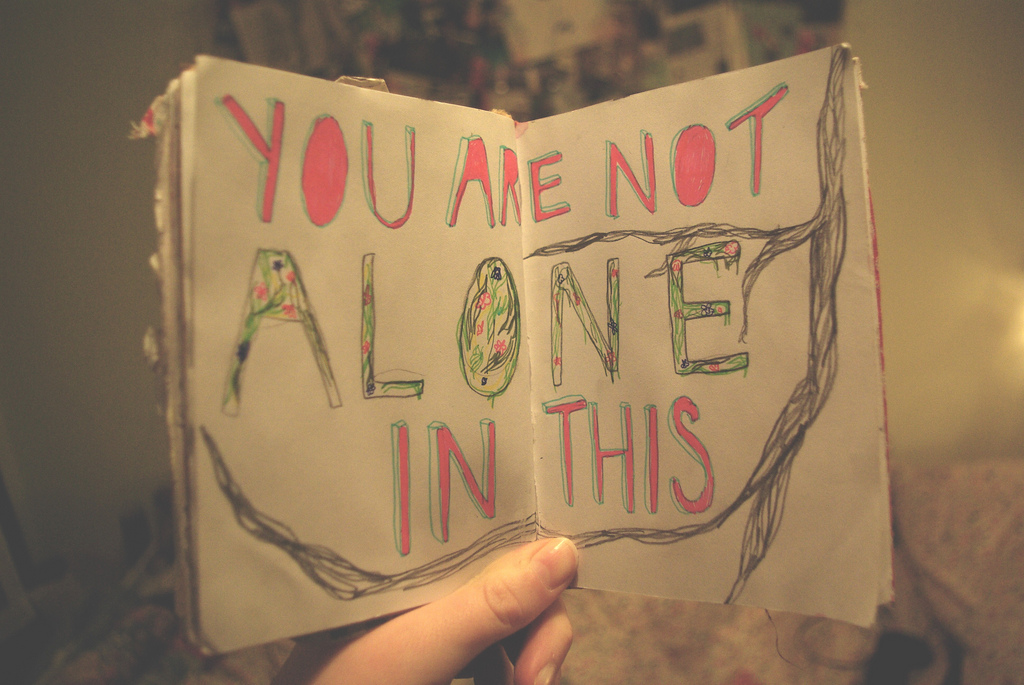
10 Things You Should Stop Saying To Chronically Ill People (And 7 Things You Should Say)
1. “Just think positive and you’ll feel better!”
(Sigh.) This is just another way of telling us our illness is our fault — that we aren’t doing enough to get better. If there was something we could do to fix it — to feel well — you bet your ass we would. Most of us have tried everything there is to try: meditation, acupressure, acupuncture, chiropractic work, exercise, massage, vitamins, yoga, therapy, diets, and, yes, positive thinking. We know what helps and what doesn’t. And guess what doesn’t help. BLAME and JUDGEMENT.
2. “Have you heard of this new wonder drug for pain? It’s called Tylenol.”
Yeah, yeah. If it’s out there, we’ve probably tried it. And it probably doesn’t work for us. One of the many unfair things about having something like chronic pain is that it often doesn’t respond to usual pain relievers (Tylenol, Ibuprofen, etc.). I could swallow a bottle of Ibuprofen and it wouldn’t touch my fibromyalgia pain.
3. “But you don’t look sick.”
And you don’t look stupid. Okay, okay. That’s not a very nice response. But I’m so sick of hearing this one. It’s just another way to tell us that what we have isn’t real. That maybe we are lazy or selfish or crazy. Chronic illness is often hidden. You can’t tell my fatigue level is so high that walking from the car to the front door feels like a marathon. You can’t tell that my friend with IBS just ate a piece of boiled lettuce and her entire body is about to explode. You can’t tell these things, and YET THEY ARE REAL. We are good at faking it. We have to. There’s no other way to get through the day.
4. “God only gives us what we can handle. He picked you because he knows you’re strong.”
Hi. You don’t know me well enough to say this. No one does. My relationship with God (if I have one) is personal. Telling me that God picked me to suffer does not make me feel better. Instead, tell me that you will pray for me to find moments of calm and peace. Or, if you really don’t know me, tell me you’ll be thinking of me.
5. “You look terrible.”
This may be true. You may have just run into me at the grocery store in my dog-walking sweat pants with my pajama top still on under my parka. I may not have brushed my hair or looked in a mirror. But here’s the deal: I only have so much energy. I only have so much I can do before the pain gets really bad. If I’m having a bad fibro day, I can’t waste precious energy on flat ironing my hair. So, if you think I look bad, keep it to yourself and know I feel even worse.
6. “I know just how you feel — I once had headache that lasted for, like, two whole days.”
No, you don’t know how I feel. Not until you’ve had a headache every day for the past seven years. Not until doctors have told you to seek therapy for your headache because it isn’t real. Not until your headache impacts your social, professional, economic, emotional, and familial life. So, that’s not what happened to you? Well then, talk to the hand. If you want to know how I feel, ask. But don’t make assumptions that you “get it.”
7. “Well, at least it’s not cancer!”
Um . . . this is such a strange thing to say I’m not even sure where to start. I am glad I don’t have cancer. And I still struggle with my own illness. There’s perspective, and there’s guilt. This comment seems to be an attempt to make me feel guilty that I feel sick when there are people out there who may feel more sick. Those of us who are sick — whether it’s with cancer, MS, fibromyalgia, IBS, arthritis, lupus, whatever — we get it. We know what it’s like to be in pain, scared, frustrated, tired, and lonely. We know that we have more in common than not. So please, don’t try to divide us or rank our illness by awfulness. That’s just not cool.
8. “I have a friend who has what you have and they died/are addicted to drugs/are a recluse who never showers.”
Thanks for the pep talk, Debbie Downer! Oh, and by the way, I have a friend who told all these terrible stories and then had no friends any more. The end.
9. “It must be nice to be able to stay home and relax all day!”
If you say this to me, you better be standing a few feet away because I may try and punch you in the face. True, it will probably hurt me more than you as I’ve injured myself peeling an orange before. BUT STILL. I will go after you. I spend literally HOURS every day trying to maintain my health to a level where I can function. This involves doctor appointments, appointments with specialists, buying diet-specific foods, cooking diet-specific foods, exercising enough so I’m not in pain but not exercising so much that I’m in pain, stretching, monitoring my medications, meditating, and, yes, resting. But let me be clear: the resting is a necessity. There are often a million other things I would rather do — like be with my daughter, spend time with my husband, talk with a friend, hold a job that pays me a salary. Managing a chronic illness is full-time work. It’s every minute of every day. And when we slip up, the consequences are horrible.
10. (Nothing.)
So, someone has just shared with you that she has a chronic illness. And you say . . . nothing. Maybe it’s because you’re nervous. Maybe it’s because you don’t know what to say. Maybe it’s because you read this list and are now terrified you will say the wrong thing. But here’s the deal: you need to say something. By telling you that we have a chronic illness, we are often saying that we trust you and we value you. We know that you may not know what our illness is. You may not even be able to even pronounce it. But we think you are willing to learn. And, above all, we think you will believe us.
Here are some good ways to say something:
“Thank you for sharing that with me.”
“I’m not sure what to say but I want you to know you are important to me.”
“How can I learn more about _______?”
“Can you tell me more about _______?”
“I would like to hear more about how ______ affects your life.”
“What is important for me to know about your illness?”
“How can I help support you and your family?”
What to do if you already screwed up and said something not-so-good:
Apologize.
And then try again.
We’ll forgive you. Because, in the end, we are all just doing the best we can. ![]()











